A Conversation With Madeleine Olnek (CODEPENDENT LESBIAN SPACE ALIEN SEEKS SAME)
(Codependent Lesbian Space Alien Seeks Same is now available on DVD and at Amazon Instant.)
Madeleine Olnek has been working as a comedian for many years: first writing and directing for the stage, followed by the production of several hilarious short films (Hold Up, Make Room For Phyllis, Countertransference). At the 2011 Sundance Film Festival, Olnek graduated to the feature realm with Codependent Lesbian Space Alien Seeks Same, which world premiered in the “Park City at Midnight” section. Olnek’s very funny, very sweet film has charmed festival audiences for the past year, and now it’s time to charm the regular movie-going public. In the days leading up to the film’s theatrical debut at the reRun Gastropub on Friday, January 6, 2012, HTN contributor Holly Herrick sat down for a hearty conversation with Olnek (read Holly’s “Pick of the Week” review over at the Filmmaker Magazine blog as well).
H2N: Can you talk about your choice for the title? It’s very funny and eye-catching, but also very specific, in actually pointing out the film’s gayness.
MO: Comedy has an obligation to be funny. I am always surprised when people make comedies and the title is really dramatic. Part of what you can do with a title—I mean, the title serves as the framing device of a movie—but you are also giving people a sample of what they are going to see. And if you can get a laugh with the title, that is already like, “Okay, the title is funny, I wonder if the whole movie is funny?” It serves as a calling card. I feel that putting “Lesbian” in the title is great because it serves as a clearinghouse for people who can’t handle this material, but also draws people in. Anyone like-minded to this kind of humor is going to think, “Oh this is funny, I want to see that.” It was years ago that a friend of mine went to see a Nicki Silver play called My Marriage to Ernest Borgnine, and I was like, “Why did you go see it?” And she said, “Because of the title.” I said, “Just because of the title?”
And that’s when this light went off in my head—how important titles were. That someone would be so intrigued to see something just because of a title, makes it also like people can try to put your work in a corner, or try to not feature it or bury it, but if you have a great title there is nothing that can be done to you that your title won’t overcome. People have always found this movie because of the title. The title is the secret weapon of the filmmaker.
H2N: I think it worked. At Sundance, it seemed like everyone knew that your movie was playing there.
MO: After the festival, Rolling Stone mentioned us saying that we had the best title of the whole festival. Why would Rolling Stone ever pay attention to a movie like this otherwise?
H2N: Can you talk a little bit about what it has been like to present your film in a gay setting, and how it has been supported by the gay festival circuit and gay industry in general?
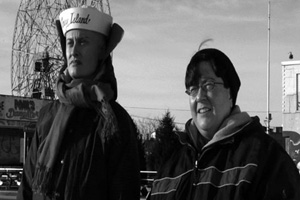 MO: Every festival has been different. Our Rooftop Films screening was actually amazing. It’s all how you roll it out. They gave us a great slot, they promoted it, and we had 1,000 people turn out. It’s about how it is featured within a festival. Rooftop was also amazing because it happened to be the same night gay marriage passed, and it passed during the screening. When I went up for the Q&A, I actually walked into the microphone, it hit me in the face. And I said, “Gay marriage passed.” And everyone cheered for 15 minutes, as if I had passed gay marriage. It was amazing. A bunch of the actors afterwards said I can’t even answer Q&A questions right now. Jackie Monahan said: “ I’ve been in a relationship for 10 years. Do I have to get married now?” There was a panic that went through some people I talked to afterwards. These women were like unplugging their televisions so that their girlfriends would not know that gay marriage had passed. So, it was this historic night. Rooftop worked so hard, they ran around to make sure the sound was right everywhere on the roof, it was magical, it was just a magical evening.
MO: Every festival has been different. Our Rooftop Films screening was actually amazing. It’s all how you roll it out. They gave us a great slot, they promoted it, and we had 1,000 people turn out. It’s about how it is featured within a festival. Rooftop was also amazing because it happened to be the same night gay marriage passed, and it passed during the screening. When I went up for the Q&A, I actually walked into the microphone, it hit me in the face. And I said, “Gay marriage passed.” And everyone cheered for 15 minutes, as if I had passed gay marriage. It was amazing. A bunch of the actors afterwards said I can’t even answer Q&A questions right now. Jackie Monahan said: “ I’ve been in a relationship for 10 years. Do I have to get married now?” There was a panic that went through some people I talked to afterwards. These women were like unplugging their televisions so that their girlfriends would not know that gay marriage had passed. So, it was this historic night. Rooftop worked so hard, they ran around to make sure the sound was right everywhere on the roof, it was magical, it was just a magical evening.
With the gay circuit, one thing that was unfortunate was that this very important gay festival programmed us as a matinee because of a scheduling conflict we had with Rooftop. Little did I know that every other festival would copy their screening time. We ended up with a lot of matinees, which was so wrong for this movie. Sometimes I attributed this scheduling decision to other things—we are a very quirky movie, we are low budget, we don’t have movie stars—but there are other factors at work in programming at gay festivals. For example, so and so, a movie star, has deigned to bless their presence in our gay world, like, there are status issues, production values stuff. But there are things that programmers consider that audiences don’t. Audiences love the movie and responded in kind, and for those festivals that gave it good screening times, it has always been an amazing experience.
H2N: How do you feel that gay institutions—media, film festivals—have been beneficial to the film’s success?
MO: Well, you have to remember that the whole reason for film festivals in the first place is to give audiences something different than they are getting in the commercial world. The commercial world is a place where, what, 7% of films are directed by women.
H2N: I’m halfway done counting for 2011. In the last six months, about 17% of theatrical releases were directed by women. The majority of them are documentaries. It’s still incredibly depressing.
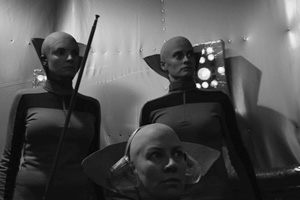 MO: Right, that’s part of the reason festivals exist, because you don’t get to see these movies in the “real world”—ha! Festivals are offering audiences something different. It’s hard. One producer I went to Columbia with had worked with a filmmaker who had made a gay short, and the short had gone all over [to festivals]. And then she worked with this other filmmaker, who made a short that wasn’t gay. She said: “There should be a festival for straight filmmakers!” And I felt like saying, “There is, it’s called the entire world.” [both laugh] And I didn’t think the second short was that great. But anyway, that whole support system you are referring to exists because there needs to be a way for people to find out about these things that they wouldn’t know about otherwise. So the support from the gay community is not about all this additional exposure, it’s just that you might get to see the film twice in your town…
MO: Right, that’s part of the reason festivals exist, because you don’t get to see these movies in the “real world”—ha! Festivals are offering audiences something different. It’s hard. One producer I went to Columbia with had worked with a filmmaker who had made a gay short, and the short had gone all over [to festivals]. And then she worked with this other filmmaker, who made a short that wasn’t gay. She said: “There should be a festival for straight filmmakers!” And I felt like saying, “There is, it’s called the entire world.” [both laugh] And I didn’t think the second short was that great. But anyway, that whole support system you are referring to exists because there needs to be a way for people to find out about these things that they wouldn’t know about otherwise. So the support from the gay community is not about all this additional exposure, it’s just that you might get to see the film twice in your town…
H2N: So, rather than being like this extra promotional force for a film, it is more equalizing.
MO: Right.
H2N: I have some questions about writing. Your short films have this great comedic arc. You start out with the pathology of these characters and it gets funnier and funnier as it goes along and you explore them further. But there is a lot less pathos in this feature. People aren’t really imposing their insanity on one another really at all aside from the characters of the government agents. Can you talk about the way you approached the comedy in this film, which is really a departure from the shorts?
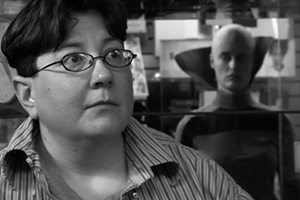 MO: This movie is a romantic comedy. As such, we don’t want to be following an insane person. We want to root for this character and be delighted by this series of events. It’s leaning towards a happy ending. One of the things that occurred to me when working with these retro themes, and not just the sci-fi, is how indie movies can feel retro too. Thinking about early black-and-white indie movies, and we see all these things we are used to seeing: first date scenes, the awkwardness, this is something—oh we are going to go back about talking about gay film again!—I have to make it clear that I hate all dramas, not just gay dramas. I really do. But one of the things I hate about gay dramas is that they always have these ridiculously homophobic characters in them that even the garden variety homophobes in the audience can feel superior to. And I feel like by making it so dramatic you are actually giving that person a lot of power. In our society, we live in this world where there have been many advances but they are limited. Like, gay marriage doesn’t exist at all on the federal level. [We are getting to a point where no one], in NY and elsewhere, who would ever say, I am a homophobe or believe homophobic ideas. So, you have these laws that are in weird relation to where everyone is socially. Like, we can watch Will & Grace and other TV shows and relate to them. So homophobia is like sci-fi; it’s this retro series of beliefs. With the characters of the government agents, I wanted to make a [homophobic] character who was a buffoon, as opposed to a very powerful person who we are afraid of, because it’s comical to us; people don’t believe in homophobia anymore. They don’t agree with this point-of-view.
MO: This movie is a romantic comedy. As such, we don’t want to be following an insane person. We want to root for this character and be delighted by this series of events. It’s leaning towards a happy ending. One of the things that occurred to me when working with these retro themes, and not just the sci-fi, is how indie movies can feel retro too. Thinking about early black-and-white indie movies, and we see all these things we are used to seeing: first date scenes, the awkwardness, this is something—oh we are going to go back about talking about gay film again!—I have to make it clear that I hate all dramas, not just gay dramas. I really do. But one of the things I hate about gay dramas is that they always have these ridiculously homophobic characters in them that even the garden variety homophobes in the audience can feel superior to. And I feel like by making it so dramatic you are actually giving that person a lot of power. In our society, we live in this world where there have been many advances but they are limited. Like, gay marriage doesn’t exist at all on the federal level. [We are getting to a point where no one], in NY and elsewhere, who would ever say, I am a homophobe or believe homophobic ideas. So, you have these laws that are in weird relation to where everyone is socially. Like, we can watch Will & Grace and other TV shows and relate to them. So homophobia is like sci-fi; it’s this retro series of beliefs. With the characters of the government agents, I wanted to make a [homophobic] character who was a buffoon, as opposed to a very powerful person who we are afraid of, because it’s comical to us; people don’t believe in homophobia anymore. They don’t agree with this point-of-view.
H2N: But the satire is there as well. Some of the time we are watching and listening to those characters and thinking, this is so sad and true! His “under-the-sea” themed wedding, etc… there is a lot of oppression in their words, you don’t know whether to laugh or cry sometimes. How do you ride the line without falling into sadness?
MO: That is what the editing is good for. I wanted there to be a contrast. I wanted the government agents to have luxury, showing off their rights. In contrast, Jane and Zoinx are having to struggle to stay together, and they will have to separate. So I wanted that contrast to be there, in addition to the creepiness of having the agents follow the women.
H2N: Let’s get back to the writing—how do you keep all the jokes so fresh, when playing up the theme of the aliens’ childlike fascination with the world?
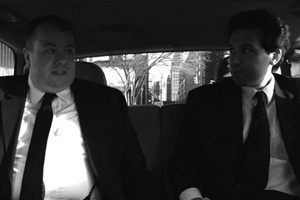 MO: It’s interesting with comedy—Woody Allen says he shoots twice as many jokes as he uses. Even if it’s good on the page, it may not work. There could be timing things, there could be something about the environment that undercuts the joke, there could be stuff about the trajectory of the character and what people’s acting styles are like, where it doesn’t work with a certain performer. With a lot of comedy, definitely the editing is the most important process. The editing went on for a year. We really did finish the day before we left for Sundance, with our sound mix and everything. It wasn’t that we started it and time passed, we were really sitting down and kept looking and looking through footage. It was a really intense process. When people talk about the difference between a short and a feature, the post-production differences are huge. I do remember this one short filmmaker saying that he felt that people who make a feature are treated differently—at festivals, by the industry—even if the feature is not that good. But to make a feature, even one that is not that good, is really hard.
MO: It’s interesting with comedy—Woody Allen says he shoots twice as many jokes as he uses. Even if it’s good on the page, it may not work. There could be timing things, there could be something about the environment that undercuts the joke, there could be stuff about the trajectory of the character and what people’s acting styles are like, where it doesn’t work with a certain performer. With a lot of comedy, definitely the editing is the most important process. The editing went on for a year. We really did finish the day before we left for Sundance, with our sound mix and everything. It wasn’t that we started it and time passed, we were really sitting down and kept looking and looking through footage. It was a really intense process. When people talk about the difference between a short and a feature, the post-production differences are huge. I do remember this one short filmmaker saying that he felt that people who make a feature are treated differently—at festivals, by the industry—even if the feature is not that good. But to make a feature, even one that is not that good, is really hard.
H2N: Can you talk about being a woman comedy director and directing a feminist comedy?
MO: Doris Dorie said that when you are a woman director on set, people want to be assured that you are completely in control and know what you are doing, but with comedy directing, knowing what you are doing is not the most productive thing creatively.
Comedy has to do with accessibility. Humor is a language with a specific result: people laughing. I feel like comedy is more subversive. You are putting stuff in there, people are reacting to it, and they are laughing; they don’t realize what idea has been put in there until later. Stuff that is overtly political is spoon-fed to you, while comedy has the power to be subversive.
There is more funding for docs than narratives. The importance of documentaries is more directly visible: this film will save a village, help people, this is important and we need your help. Everyone understands that. Understanding the importance of narrative is harder for people. It’s a made up story. Talking about comedy, there is a general anxiety about women in charge. Tina Fey was talking about, in her book, how people come up to her all the time and ask her how hard it is to be a boss and be in charge of so many people. And she says something like, “Yeah, they ask that question to Donald Trump all the time, too!” When you are on set as a director, you are the person in charge. So there is a lot of anxiety: can this person do it, can we trust them, do they know what they are doing?
And there is part of the comedy process, I think, that involves going to zero every time. Really looking at stuff hard, and saying, “This sucks, it doesn’t work, it’s not funny.” In comedy you have to throw away stuff, I think drama has more leeway, because you don’t have to make someone cry in every scene. Comedy has a very specific result, and it’s very obvious when it is working or not working. To me, uncertainty, having listening skills—that is what comedy is all about. That is not an authoritarian position to be in. I think authoritarian is something people are more comfortable with. I think putting a self-effacing female—which happens to be what comedians are like: “I suck!”—if [a financier] is putting 9 million dollars into a movie, and [the director] is like “I suck! This sucks!” That brings up some anxiety for [financiers].
I don’t think you can separate filmmaking from other arts when you talk about [seeing more women in positions of power]. Everyone wants to be an artist, everyone wants to make a movie. At a certain point, when those become shit jobs, like nurse’s aids or teaching assistants, then there will be plenty of opportunities for women! Art is supposed to be the mirror held up to society. So how art is made is going to reflect how society itself works, I think.
You can come up with so many reasons for inequality. You can come up with reasons for it, but the reason is inequity, people who have power not wanting to give it up to the people who don’t.
H2N: You have a run-and-gun filmmaking style. You try to not rely on a lot of equipment and crew. What is essential for you to making your shoot happen?
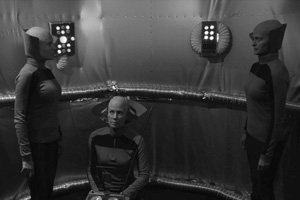 MO: I have to have an actor-centered set. The day Mike Tully was on set [EDITOR’S NOTE: Ms. Olnek likely mentioned yours truly by name as she knew which publication this conversation was for], we only had that location for a day. That’s hard. Some scenes, I keep doing take after take. I don’t want to leave until I have it. I try to make it so that all the locations are places I can keep coming back to, so that there can be more of a richness to the performances. My style is still evolving as a director, but this is how we work: we plug directly into the camera for sound, and we don’t use lens adaptors. I just think that anything you add takes time and attention away from the performances and the material. Some of the scenes we started shooting with lights and did pick ups without lights, and it didn’t look noticeably different!
MO: I have to have an actor-centered set. The day Mike Tully was on set [EDITOR’S NOTE: Ms. Olnek likely mentioned yours truly by name as she knew which publication this conversation was for], we only had that location for a day. That’s hard. Some scenes, I keep doing take after take. I don’t want to leave until I have it. I try to make it so that all the locations are places I can keep coming back to, so that there can be more of a richness to the performances. My style is still evolving as a director, but this is how we work: we plug directly into the camera for sound, and we don’t use lens adaptors. I just think that anything you add takes time and attention away from the performances and the material. Some of the scenes we started shooting with lights and did pick ups without lights, and it didn’t look noticeably different!
The thing I hate most on big sets is when you have a lot of people standing around, and someone is inevitably eating chips while an actor in front of the camera is hungry. You know what it’s like when you are hungry and you see someone open a delicious bag of flavored chips. It makes sense that this happens because people are bored and standing around during these endless takes, but once there is a split between everyone contributing to this effort and other people on a different level of energy and activity, that’s when you have problems. That’s what I try to avoid, with varying levels of success.
A lot of comedy is delivered. I don’t know if I could ever do a set where it’s prescribed: “We are going to do three takes of each shot.” What if I do three takes and none of those takes are funny?
There was one day on my set where everyone thought that the day was going really well because we were on schedule. I knew it wasn’t going well at all. Nothing had made me laugh all day. This idea of efficiency takes on different meanings with comedy. For some people on set, it’s getting everything in the can. What about how funny it is? That also has to be a value.
H2N: When you work with your tiny crew, how do you give yourself the time to make sure you are really focused on the performance and not worrying about other details?
MO: It helps to be minimal and physically close to the performers, to not be a monitor director. It helps to trust your inner voice and shut down everyone who hates you, which is pretty much everyone on set at that point. On every set of mine, I am the most hated figure by anyone on the technical side.
You have to remember: For everyone else who works on the movie, when the shoot is over, they go home, and are free. You are basically married to this footage. You will spend 10,000 hours with the footage. Anything you didn’t ask for or didn’t get is going to haunt you over and over. You are going to go through it, you are going to edit it, you are going to dub it to tape, you are going to sit through endless dubbing sessions to make sure everything is right, you are going to take it to festivals, you’ll sit through this movie 10,000 times. Everyone who is so adamant on set about what they want, they are not entering into a marriage with the footage like the director is. People were confused during the days where I kept going over and over certain takes; those scenes, I am so proud of what I was able to get. I made a decision with space aliens that I didn’t want to take a bit here and a bit there. I wanted the actor to organically incorporate the notes into every new take, so that it wasn’t Franken-editing, piecing moments together. I wanted them to organically go through the beats. It made a huge difference.
Even if you shoot for a month, like Woody Allen, that’s only a month. And then that movie exists for years! People on set will say, “Oh, it’s five o’clock.” Do you know how many five o’clock’s will pass for as long as this movie lives? As director, you are the one. Everyone else leaves. Even if they are stressed out, you are the one left living with the footage, with what happened on set.
H2N: How do you budget for your time?
MO: I work with volunteers. So obviously this stresses people’s limits. This is what always happens: people jump on board because they know and love my films. As we go along, I am the same me: I’m the same person who made those films using the same process of uncertainty. But at a certain point people get totally freaked out—with the exception of one group of people: the actors. I pretend that I’m at a party and they are the only people I have eyes for. And they are totally into it. Their energy sustains me. There are some nuances in acting that people can’t pick up when they are focused on other things, and the crew should be focused on other things. That’s their job.
H2N: Does having a small crew keep that wayward energy under control?
MO: Since its just a couple people watching, there is more productivity, and less of people’s time being wasted. But I’m still working out ways to be more efficient. I’m fascinated by directors working with three-person crews. That would be my ideal.
H2N: Do you rehearse?
MO: We rehearsed a lot. Especially for the dance scene.
H2N: Do you worry about losing the freshness of the script or comedy in the rehearsal?
MO: No. To do it more only makes it go deeper.
H2N: Does that come from your theater experience?
MO: Yeah. You have to be careful of the netherworld. Maybe people do a first great reading, and as you go along, it comes apart, but if you go deeper it emerges more profound. Where people get into trouble is if they rehearse very little, because then people forget their first impulses. So most people don’t rehearse at all, which is weird when you think about.
H2N: Did you direct the plays you wrote?
MO: I always directed. That was a problem for me. As I moved up the ladder, I was expected to step aside and let someone else direct, and often that person didn’t get the comedy or the hotness or whatever. Because of my subject matter I was put in this avant-garde realm, which wasn’t appropriate. It was frustrating. In theater, you weren’t expected to be a writer/director. In film, that’s the norm. That’s one of the reasons I started working in film.
H2N: What’s up with you and video? Obviously, it makes your process possible.
MO: Yes, it makes it possible.
H2N: But, you love NY films from the ‘70s and ‘80s that are shot on film, and yet you talk about loving the aesthetic of video.
MO: Film is beautiful. Life is actually flat. Video is more true to life, because it’s flatter. If you look around this coffee shop, it doesn’t look shot on film. The light is a little harsh, I have some down light on me, it’s flat and pedestrian looking. I think Aristotle said that drama portrays men as better than they are and comedy is worse. Video is right for comedy.
H2N: That is an extremely philosophical interpretation though, of film vs. video, as many would say that film’s richness is more true to life and living beings.
MO: But that’s drama, isn’t it? “That’s a beautiful world. It’s so sad. Something is happening to this person in this beautiful world, isn’t that so sad.”
H2N: So you hate drama, and you hate film!
MO: I do think Stranger Than Paradise may be the most perfect movie ever made. When I saw his movie, that was the first time I understood that cinema could include that kind of point-of-view. I thought I could make a movie, because if it could include this sensibility, then there is room for a voice like mine.
— Holly Herrick







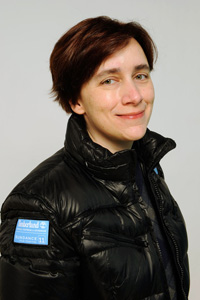

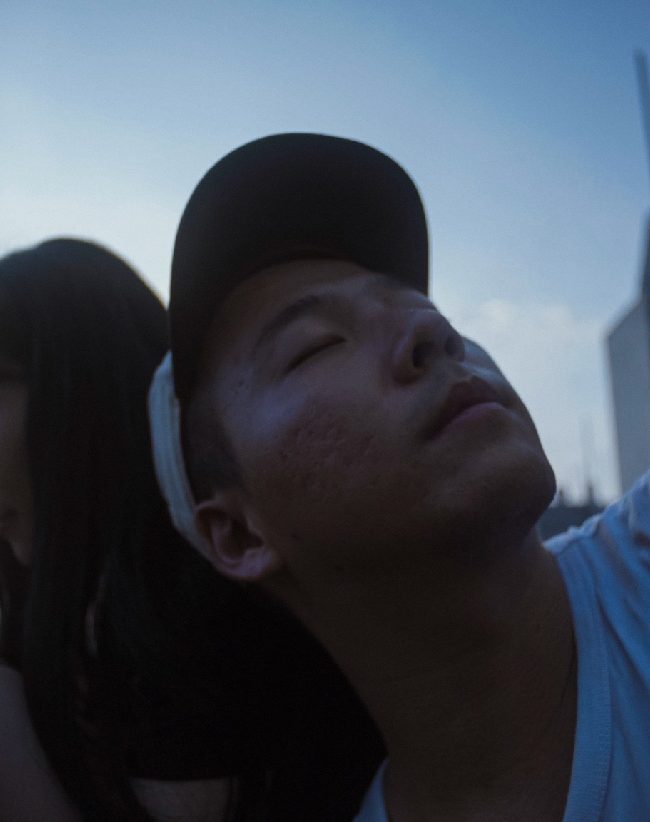
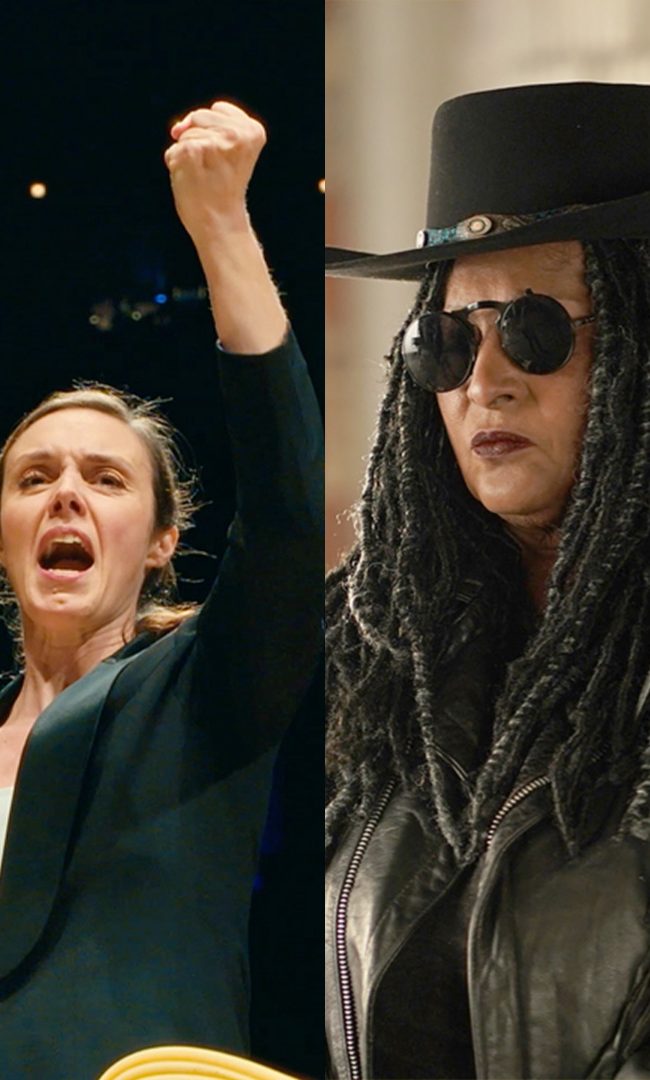


Pingback: ifp | Independent Filmmaker Project
Pingback: THE 2012 HAMMER TO NAIL AWARDS – Hammer to Nail